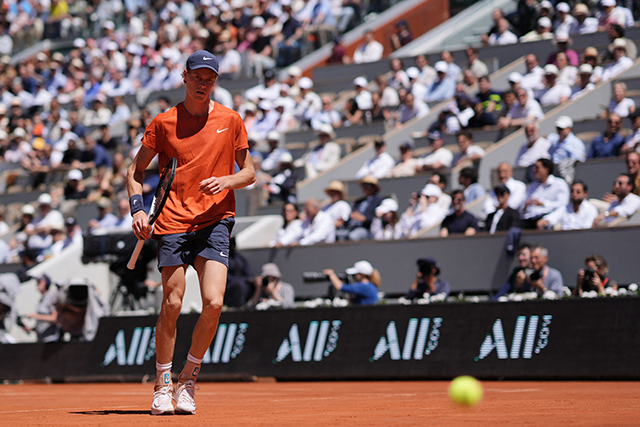MILAN, Italy — Jannik Sinner's long doping saga came to an end on Saturday after he agreed to a three-month ban from tennis, the World No.1 admitting "partial responsibility" for team mistakes which led to him twice testing positive for traces of clostebol in March last year.
The February 9 to May 4 suspension means Sinner will be free to play in the French Open, the second Grand Slam of the season, which begins on May 25 at Roland Garros.
In a statement, Sinner said that the World Anti-Doping Agency (WADA) accepted that he "had no intent and did not derive any competitive advantage from the two positive tests" of the banned substance.
Australian Open champion Sinner has always said that clostebol entered his system when his physiotherapist used a spray containing it to treat a cut before providing a massage and sports therapy.
"This case had been hanging over me now for nearly a year and the process still had a long time to run with a decision maybe only at the end of the year," Sinner said.
"I have always accepted that I am responsible for my team and realise WADA's strict rules are an important protection for the sport I love. On that basis I have accepted WADA's offer to resolve these proceedings on the basis of a three-month sanction."
WADA said separately that "Sinner did not intend to cheat" but that he would serve his suspension as he is responsible for the actions of his entourage.
Sport's global doping watchdog confirmed it was withdrawing its appeal to the Court of Arbitration for Sport (CAS), which was due to hear the case in April.
The agreement between Sinner and WADA also means that Sinner will be able to play in front of his home fans at the Rome Open which kicks off just after the end of his suspension and is the last big clay-court tournament before Roland Garros.
Saturday's announcement brings to an end a controversy which has followed Sinner everywhere just as he rose to become the top player in men's tennis and a multiple Grand Slam winner.
Doping controversy
Sinner was facing a potential ban of two years after WADA appealed to CAS against his initial exoneration by the International Tennis Integrity Agency (ITIA), announced in August.
The positive tests were not intially made public while the ITIA investigation was ongoing and Sinner had been allowed to carry on playing after successfully appealing provisional suspensions.
"We were satisfied that the player had established the source of the prohibited substance and that the breach was unintentional. Today's outcome supports this finding," said the ITIA on Saturday.
The ITIA's initial ruling caused uproar among a section of the men's tour, with outspoken Australian player Nick Kyrgios calling it "ridiculous" and pouring scorn on Sinner's explanation for the contamination.
Kyrgios reacted to Saturday's announcement on X, posting: "Guilty or not? Sad day for tennis. Fairness in tennis does not exist."
And three-time Grand Slam winner Stan Wawrinka was equally damning of the deal, writing: "I don't believe in a clean sport anymore."
The ITIA's decision was made public just days before last year's US Open, which Sinner subsequently won to claim his second Grand Slam after breaking his major tournament duck at the previous Australian Open.
Sinner then successfully defended his title at Melbourne Park last month, becoming just the fourth man to do so since the turn of the century alongside tennis icons Andre Agassi, Roger Federer and Novak Djokovic.
By that point he had confirmed his status as national hero in Italy by winning the ATP Finals in Turin and then starring in his country's second straight Davis Cup triumph.
Sinner, who pulled out of defending his title at this month's Rotterdam Open, had previously been viewed with some suspicion in the Mediterranean nation.
His origins in the German-speaking areas of South Tyrol and residence in Monaco led to local media and former tennis players casting doubt on whether he was Italian at all.
But he is now Italy's biggest sports star after surging to the top of the sport ahead of Spain's golden boy Carlos Alcaraz, himself a four-time Grand Slam champion at the age of 21.
